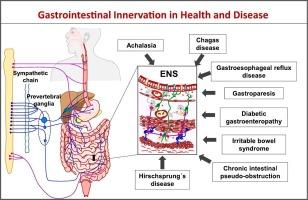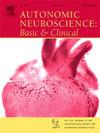Neurogastroenterology: Current insights into gastrointestinal innervation in health and disease
IF 3.3
4区 医学
Q2 NEUROSCIENCES
引用次数: 0
Abstract
Neurogastroenterology, a rapidly evolving field, investigates the intricate interactions between the nervous system and the organs of the gastrointestinal tract. This review offers a comprehensive summary of innervation of the gastrointestinal tract, focusing on both extrinsic and intrinsic components. Extrinsic innervation involves the autonomic nervous system, with sympathetic and parasympathetic fibers controlling various digestive functions, while intrinsic innervation, represented by the enteric nervous system, operates largely independently, orchestrating complex processes such as motility, secretion, and immune responses. Recent advances highlight the crucial role of the enteric nervous system, often referred to as the second brain, in maintaining gastrointestinal health and its involvement in various pathologies. The text also provides a basic overview of the pathophysiology of achalasia, Chagas disease, gastroesophageal reflux disease, gastroparesis, diabetic gastroenteropathy, irritable bowel syndrome, chronic intestinal pseudo-obstruction, and Hirschsprung's disease, which are conditions in which innervation of the gastrointestinal tract is more or less affected. The insights provided could pave the way for new interventions, offering hope for patients suffering from related conditions.

神经胃肠病学:健康和疾病中胃肠神经支配的最新见解
神经胃肠病学是一个快速发展的领域,研究神经系统和胃肠道器官之间复杂的相互作用。这篇综述提供了胃肠道神经支配的综合总结,重点是外在和内在成分。外神经支配涉及自主神经系统,由交感和副交感神经纤维控制各种消化功能,而以肠神经系统为代表的内在神经支配在很大程度上独立运作,协调运动、分泌和免疫反应等复杂过程。最近的进展强调了肠神经系统的关键作用,通常被称为第二大脑,在维持胃肠道健康及其参与各种病理。文本还提供了贲门失弛缓症,恰加斯病,胃食管反流病,胃轻瘫,糖尿病胃肠炎,肠易激综合征,慢性肠假性梗阻,和先天性巨结肠病的病理生理学的基本概述,这是条件下,其中胃肠道的神经支配或多或少受到影响。所提供的见解可以为新的干预措施铺平道路,为患有相关疾病的患者带来希望。
本文章由计算机程序翻译,如有差异,请以英文原文为准。
求助全文
约1分钟内获得全文
求助全文
来源期刊
CiteScore
5.80
自引率
7.40%
发文量
83
审稿时长
66 days
期刊介绍:
This is an international journal with broad coverage of all aspects of the autonomic nervous system in man and animals. The main areas of interest include the innervation of blood vessels and viscera, autonomic ganglia, efferent and afferent autonomic pathways, and autonomic nuclei and pathways in the central nervous system.
The Editors will consider papers that deal with any aspect of the autonomic nervous system, including structure, physiology, pharmacology, biochemistry, development, evolution, ageing, behavioural aspects, integrative role and influence on emotional and physical states of the body. Interdisciplinary studies will be encouraged. Studies dealing with human pathology will be also welcome.

 求助内容:
求助内容: 应助结果提醒方式:
应助结果提醒方式:


